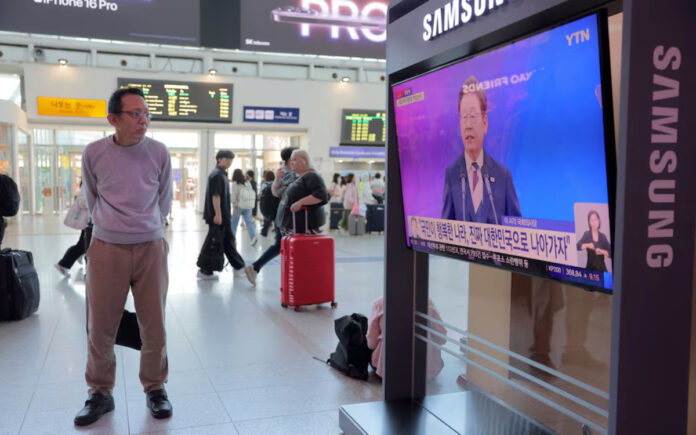Seoul: South Korea’s newly elected President Lee Jae-myung is expected to pursue a cautious and deliberate approach to ongoing trade negotiations with the United States, leveraging the country’s transition of power to gain critical time, according to sources close to the ruling Democratic Party.
Lee assumed office just hours after narrowly winning the June 3 snap presidential election—without the customary two-month transition period—facing the immense challenge of steering an export-reliant economy in the shadow of global trade tensions. On the eve of his victory, Lee emphasized, “the most pressing matter is trade negotiations with the United States.”
With key South Korean industries such as semiconductors, automobiles, and shipbuilding heavily intertwined with international markets, the stakes of these negotiations are high. Yet Lee inherits an economy forecast to grow by just 0.8% this year, the slowest pace since 2020, amid lingering political instability following former President Yoon Suk Yeol’s failed attempt at declaring martial law.
Adding pressure, a draft letter reviewed by Reuters suggests that the Trump administration has called on negotiating partners to submit their best trade offers by Wednesday. However, a South Korean trade ministry official declined to confirm whether Seoul had received the letter.
Leveraging Transition to Buy Time
With Seoul experiencing a leadership vacuum over the past six months, government insiders say the new administration has an opportunity to slow the pace of negotiations and observe how parallel talks between the U.S., China, and Japan unfold.
“The new administration will need to take a fresh look at the overall framework of the negotiations and that will be a buffer to buy time, which the U.S. cannot reject,” said a trade expert involved in developing Lee’s strategic approach.
While Lee may not formally request an extension immediately, his senior diplomatic adviser noted such a request would likely follow an internal review of negotiation progress. Lawmakers suggest that delays in other countries’ negotiations with Washington could also buy Seoul valuable time.
“It will be strategically right to take a wait-and-see stance because the situation is changing within the United States and around negotiations of other countries,” a ruling party lawmaker explained.
Strategic Silence and Missed Deadlines
South Korea had previously agreed in April to work on a “July package” with the U.S. that would lift tariffs before the expiration of a 90-day moratorium on Trump’s reciprocal tariffs. However, political turmoil has stalled that progress.
Lee, who remained largely silent on divisive trade issues during his campaign, is now being praised by his allies for that discretion, calling it a “strategic move.” Since taking office, he has pushed back against the urgency of finalizing a deal by July 8.
Following Lee’s victory, the Korea International Trade Association urged his administration to “respond quickly to the rapidly changing foreign trade order” and employ the full weight of South Korea’s diplomatic and trade tools to negotiate from a position of strength.
Trump’s sweeping tariff policies—including 25% duties on South Korean exports—remain in effect despite legal challenges. Seoul’s negotiating strategy will likely be informed by China’s recent 90-day truce agreement with the U.S., and Japan’s hesitation to finalize any deal without clear exemptions on key auto sector tariffs.
“For different reasons, China and Japan will be references for us, with the former on the possibility of U.S. policy changes and the latter on how to make moves under a similar circumstance,” another trade expert said.
G7 Opportunity and Strategic Calculations
Heo Yoon, economics professor at Sogang University, suggested Lee could use the upcoming G7 summit in Canada as a diplomatic platform to request an extension to the tariff truce. “There is a G7 meeting in Canada in mid-June, where South Korea could be invited to join and use it as a chance to extend the tariff-pause deadline,” Heo said.
Also Read | Russian Forces Push Closer to Sumy, Ukraine Warns of Escalating Threat
Such an extension, he added, would also benefit Washington, reinforcing Seoul’s alignment with the U.S. over Beijing.
Although some experts see potential for coordinated efforts with Japan on energy and auto tariff issues, Seoul’s party insiders expect a “two-track” approach in the short term—where existing officials continue talks while the new administration formulates its broader strategy.
South Korea’s Strategic Advantage
South Korea’s strength in industries important to U.S. interests—including technology and shipbuilding—gives it notable leverage. Jay Truesdale, a former U.S. diplomat and CEO of Washington-based advisory firm TD International, noted, “Successful outcomes require offers that support the president’s domestic agenda, and this will be comparatively easy for Korea given its importance in politically sensitive industries.”
Also Read | Elon Musk Blasts Trump’s Tax and Spending Bill as ‘Disgusting Abomination’
Kathleen Oh, chief economist for Korea and Taiwan at Morgan Stanley, echoed that sentiment, saying Seoul has more room to negotiate than peers like Taiwan. She pointed out that South Korea can reduce its trade surplus with the U.S. through increased imports or by offering lower tariffs on select agricultural products, including rice—a key concern raised by Trump.
Still, officials close to Lee insist there’s no need to rush.
“In the worst-case scenario, if tariffs are adjusted after we sign an agreement, that might mean we made unnecessary concessions,” one trade expert warned. “It’s not like we don’t have any leverage.”



